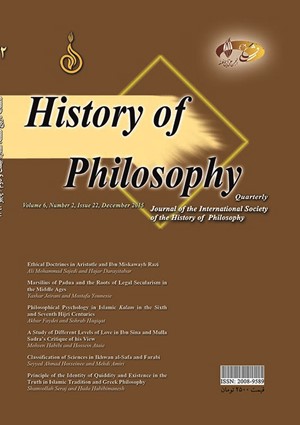-
-
List of Articles
-
Open Access Article
1 - foreword
Hossein Kalbasi Ashtari -
Open Access Article
2 - Ethical Doctrines in Aristotle and Ibn Miskawayh Razi
Ali Mohammad Sajedi Hajar Darayitabar -
Open Access Article
3 - Marsilius of Padua and the Roots of Legal Secularism in the Middle Ages
Yashar Jeirani Mostafa Younesie -
Open Access Article
4 - Philosophical Psychology in Islamic Kalam in the Sixth and Seventh Hijri Centuries
Akbar Faydei Sohrab Haqiqat -
Open Access Article
5 - A Study of Different Levels of Love in Ibn Sina and Mulla Sadra’s Critique of his View
Mohsen Habibi Hossein Ataie -
Open Access Article
6 - Classification of Sciences in Ikhwan al-Safa and Farabi
Seyyed Ahmad Hosseinee Mehdi Amiri -
Open Access Article
7 - Principle of the Identity of Quiddity and Existence in the Truth in Islamic Tradition and Greek Philosophy
Huda Habibimanesh Shamsollah Seraj
-
The rights to this website are owned by the Raimag Press Management System.
Copyright © 2017-2026







